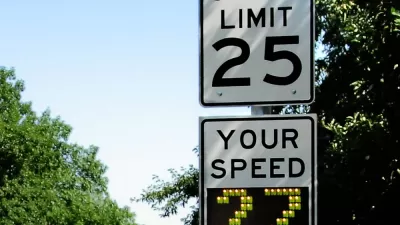Denver, dealing with an increase in traffic fatalities during the pandemic, has lowered speed limits on some residential streets. Critics say the new law neglects the most needed traffic safety changes.

"The default speed limit on Denver’s unposted streets will soon be lowered from 25 mph to 20 mph after the Denver City Council approved the change Monday," reports Hannah Metzger for The Denver Gazette.
"The approved measure will reduce the default speed on city streets where no limit is posted, applying most specifically to neighborhood streets with no center line," adds Metzger. "The Department of Transportation said it will also decrease the speed limits of posted neighborhood streets to 20 mph beginning in 2022."
Councilmember Kendra Black was the sole no vote on the change. The article provides space for the councilmember to make the case that the speed limit changes are targeting the wrong kind of street, with arterials the source of the most carnage on local roads.
Like many other Vision Zero cities, the recent years has been particularly deadly—with the most fatalities since the city announced its Vision Zero initiative in 2016. There does seem to be an uptick in the number of cities lowering speed limits. Norfolk, Virginia was the previous example picked up by Planetizen.
FULL STORY: Denver to lower neighborhood speed limits to 20 mph

Alabama: Trump Terminates Settlements for Black Communities Harmed By Raw Sewage
Trump deemed the landmark civil rights agreement “illegal DEI and environmental justice policy.”

Planetizen Federal Action Tracker
A weekly monitor of how Trump’s orders and actions are impacting planners and planning in America.

The 120 Year Old Tiny Home Villages That Sheltered San Francisco’s Earthquake Refugees
More than a century ago, San Francisco mobilized to house thousands of residents displaced by the 1906 earthquake. Could their strategy offer a model for the present?

In Both Crashes and Crime, Public Transportation is Far Safer than Driving
Contrary to popular assumptions, public transportation has far lower crash and crime rates than automobile travel. For safer communities, improve and encourage transit travel.

Report: Zoning Reforms Should Complement Nashville’s Ambitious Transit Plan
Without reform, restrictive zoning codes will limit the impact of the city’s planned transit expansion and could exclude some of the residents who depend on transit the most.

Judge Orders Release of Frozen IRA, IIJA Funding
The decision is a victory for environmental groups who charged that freezing funds for critical infrastructure and disaster response programs caused “real and irreparable harm” to communities.
Urban Design for Planners 1: Software Tools
This six-course series explores essential urban design concepts using open source software and equips planners with the tools they need to participate fully in the urban design process.
Planning for Universal Design
Learn the tools for implementing Universal Design in planning regulations.
Clanton & Associates, Inc.
Jessamine County Fiscal Court
Institute for Housing and Urban Development Studies (IHS)
City of Grandview
Harvard GSD Executive Education
Toledo-Lucas County Plan Commissions
Salt Lake City
NYU Wagner Graduate School of Public Service





























